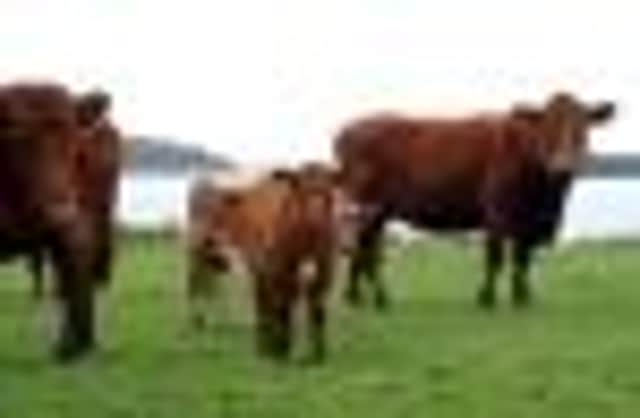Black market food alert over cattle rustling


They say that customers who believe they are getting a bargain Sunday roast are putting themselves and their families at risk from deadly bacteria such as E coli and salmonella.
Rural insurers NFU Mutual said livestock rustling “rocketed” in Scotland last year, with claims rising by 165 per cent.
Advertisement
Hide AdAdvertisement
Hide AdThe crime, in popular imagination associated with historical figures such as Rob Roy MacGregor and Ned Kelly, is on the increase thanks to rising demand from shoppers, restaurants and takeaways for cheaper meat.
The all-time high price of lamb – a leg can now cost up to £40 – and the animals’ small, easily transportable size is making them a target for thieves.
Livestock snatched from fields is killed in illegal abattoirs or at private premises where there are neither hygiene checks nor any assessment for diseases before slaughter.
Tom Bell, chief executive of the Royal Environmental Health Institute of Scotland, said: “Sheep rustling and the subsequent illegal distribution of animal carcasses raises a number of significant public health issues. Scotland has extremely high standards in place within the food industry to protect public health and animal welfare.
“Meat entering the food chain without undergoing appropriate inspection and proper processing puts the public’s health at risk on a number of levels.
“It could be contaminated with disease, hosting parasites and contaminated with high acid levels, but without the ability to trace the source of the meat, the public is in greater danger. We have seen in the past the devastating effects of contaminated meat on human health and we would urge anyone offered meat from an unofficial source not to accept it.”
A spokeswoman for the Food Standards Agency in Scotland, the government body responsible for overseeing slaughterhouses, said anyone buying meat on the black market was “playing Russian roulette with their health”.
She said: “These products have not been approved for sale and could pose a serious risk. As well as harmful bacteria, such as salmonella and E coli, illegal meat could contain veterinary medicines that have not yet passed through the animal’s system.”
Advertisement
Hide AdAdvertisement
Hide AdAnd Mark Smith, owner of George Bower’s butcher shop in Stockbridge, Edinburgh, said consumers were mistaken if they thought they were getting a product similar to legally sourced lamb from butchers shops or supermarkets.
“The techniques used in abattoirs are so efficient they give the lamb a nice couple of millimetres of fat,” he said.
“The meat is nice and pink with white fat which also looks good for display purposes when putting it out in the shop or on the table when cooked.
“This is also due to the lambs being ‘finished’ for a couple of weeks by being given supplement food before they are killed.
“If the animals are taken straight off the field, not killed properly and ‘finished’, there won’t be any fat and the meat will be a darker colour from the blood. Meat like that would not have the taste and be of high quality, it would be more like something you would use to make into a stew.”
Tim Price, rural affairs spokesman for NFU Mutual, said the value of livestock stolen in Scotland doubled last year at an estimated cost to Scottish farmers of £250,000, and that the number of sheep stolen tripled.
The cost of rustling throughout the UK increased by 170 per cent in 2011 – including around 67,000 sheep at a cost of £6 million.
Some farmers are even resorting to using CCTV cameras trained on their fields and country lanes to catch the thieves who have been known to steal scores of animals at any one time.